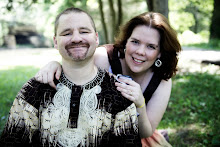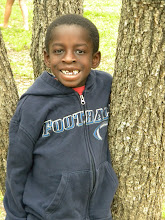Adoption Awareness: Ignorance is Bliss???
Mama D.'s Dozen said:
How do you respond to adoptive parents that are adamant that other adoptive parents NOT share the hard truths on their blogs. The people that think that "if the hard stuff is shared, than it will scare people away from adopting".
I think, if the hard stuff scares someone away from adoption, then they probably weren't cut out to adopt in the first place. Honestly. Maybe the hard stuff makes us take a step back. Maybe it makes us re-evaluate our motives for adoption and what we can really handle (or feel God has assured us He can help us handle). That seems like a good sort of "scare" to go through. But if you're so scared by adoption reality that you are scared away from it entirely, it's probably for the best.
With adoption, ignorance is not bliss. Ignorance is a nasty bacteria during the process, that can spread to a huge boil after homecoming! Adoptive parents need to share the good, the bad, the ugly, and the in-between with each other.
I do think there are some pitfalls to avoid when sharing. It seems really easy to start generalizing once there is a bad experience. I had a HORRID experience with our first Ghana agency. I will share about that horrid experience. But I know that others have had really good experiences with the same agency. My experience doesn't trump theirs. We post-adoptive parents can't act as if what happened in our experience is likely to happen again. We can only share information on one family's-adoption--our own.
**We adopted a young infant who ended up having post-trauma and attachment issues. Exception rather than the rule. We are the family that says, "Don't assume infants don't have attachment difficulties."
**We adopted a young "healthy" infant who ended up having a life-threatening disease--undiagnosed at the time of adoption. Exception rather than the rule. We are the family that says, "Remember, the younger the child, the more likely that there is an undiagnosed health issue."
**We adopted a toddler with previous severe malnutrition. We now have a preschooler with several emerging developmental/behavioral/learning differences. The possibility of long-term effects from early malnutrition are becoming reality for our son and our family. We are the family that says, "Don't ignore the possibilities of long-term effects of malnutrition. It can be serious stuff."
**We adopted an HIV+ toddler who had been severely neglected, alcohol and drug exposed before birth, and significantly malnourished. We now have a preschooler who is completely healthy and (so far) shows no long term effects from the alcohol drug exposure beyond a poor stress response. We are the family that says, "Don't assume that all alcohol/drug exposed kids and previously malnourished kids will have long-term effects."
All of our adoptive placements has something that makes them out of the ordinary. I share about those things very openly. However, I want to be very careful not to make people feel that what happened in our family will happen in theirs--the good and the bad! It's not typical to do two toddler adoptions with absolutely no attachment issues, anymore than it's typical to adopt a young infant with attachment issues or a 1 in a million disease! What people can learn from others being open about the good, the bad, and the ugly is that they cannot expect their future adoption to go one way or another. YOU MUST BE READY TO ACCEPT ALL POSSIBLE OUTCOMES. YOU MUST NOT BE SO IGNORANT AS TO BELIEVE "IT WON'T (OR WILL) HAPPEN TO ME!"
How do you respond to adoptive parents that are adamant that other adoptive parents NOT share the hard truths on their blogs. The people that think that "if the hard stuff is shared, than it will scare people away from adopting".
I think, if the hard stuff scares someone away from adoption, then they probably weren't cut out to adopt in the first place. Honestly. Maybe the hard stuff makes us take a step back. Maybe it makes us re-evaluate our motives for adoption and what we can really handle (or feel God has assured us He can help us handle). That seems like a good sort of "scare" to go through. But if you're so scared by adoption reality that you are scared away from it entirely, it's probably for the best.
With adoption, ignorance is not bliss. Ignorance is a nasty bacteria during the process, that can spread to a huge boil after homecoming! Adoptive parents need to share the good, the bad, the ugly, and the in-between with each other.
I do think there are some pitfalls to avoid when sharing. It seems really easy to start generalizing once there is a bad experience. I had a HORRID experience with our first Ghana agency. I will share about that horrid experience. But I know that others have had really good experiences with the same agency. My experience doesn't trump theirs. We post-adoptive parents can't act as if what happened in our experience is likely to happen again. We can only share information on one family's-adoption--our own.
**We adopted a young infant who ended up having post-trauma and attachment issues. Exception rather than the rule. We are the family that says, "Don't assume infants don't have attachment difficulties."
**We adopted a young "healthy" infant who ended up having a life-threatening disease--undiagnosed at the time of adoption. Exception rather than the rule. We are the family that says, "Remember, the younger the child, the more likely that there is an undiagnosed health issue."
**We adopted a toddler with previous severe malnutrition. We now have a preschooler with several emerging developmental/behavioral/learning differences. The possibility of long-term effects from early malnutrition are becoming reality for our son and our family. We are the family that says, "Don't ignore the possibilities of long-term effects of malnutrition. It can be serious stuff."
**We adopted an HIV+ toddler who had been severely neglected, alcohol and drug exposed before birth, and significantly malnourished. We now have a preschooler who is completely healthy and (so far) shows no long term effects from the alcohol drug exposure beyond a poor stress response. We are the family that says, "Don't assume that all alcohol/drug exposed kids and previously malnourished kids will have long-term effects."
All of our adoptive placements has something that makes them out of the ordinary. I share about those things very openly. However, I want to be very careful not to make people feel that what happened in our family will happen in theirs--the good and the bad! It's not typical to do two toddler adoptions with absolutely no attachment issues, anymore than it's typical to adopt a young infant with attachment issues or a 1 in a million disease! What people can learn from others being open about the good, the bad, and the ugly is that they cannot expect their future adoption to go one way or another. YOU MUST BE READY TO ACCEPT ALL POSSIBLE OUTCOMES. YOU MUST NOT BE SO IGNORANT AS TO BELIEVE "IT WON'T (OR WILL) HAPPEN TO ME!"











0 comments:
Post a Comment